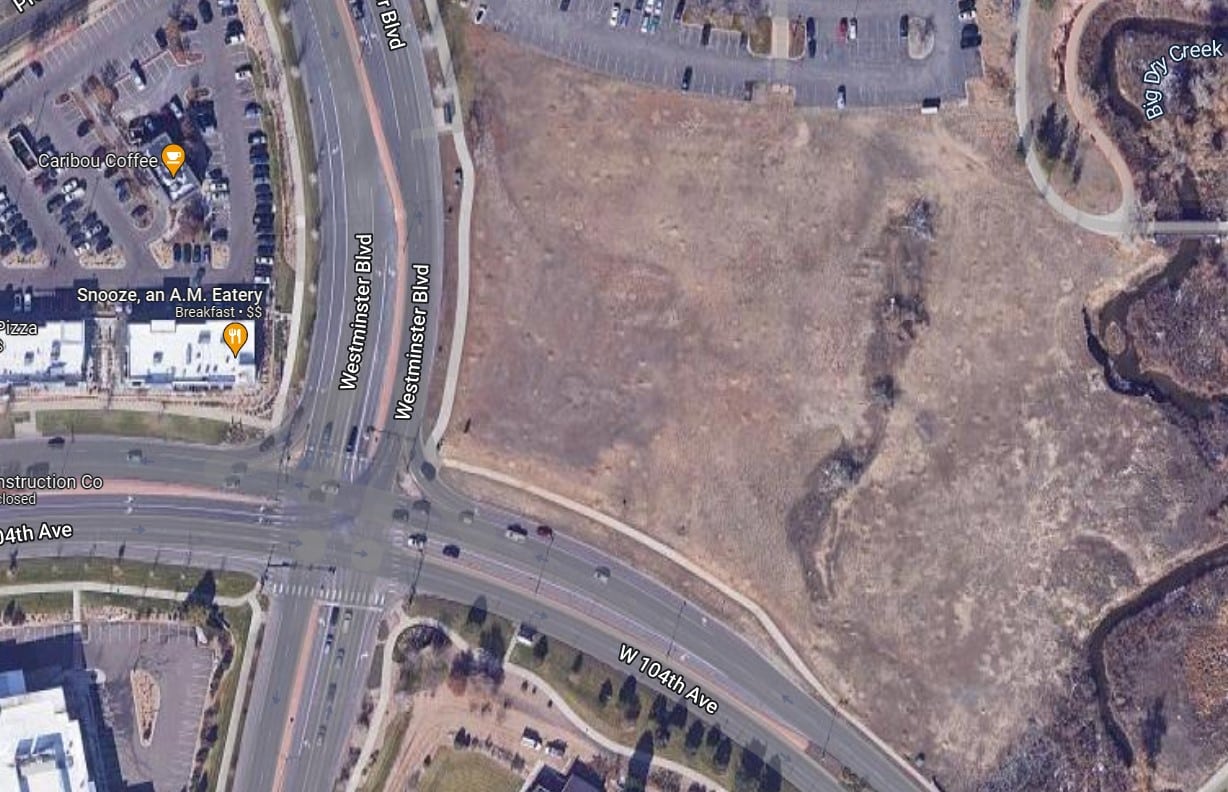A hotel developer cannot sue the City of Westminster for refusing to sell it 8 acres at the corner of 104th Avenue and Westminster Boulevard, a judge ruled last week.
Rozzi Capital, a small Denver firm, signed a letter of intent with Westminster in 2021 in which both sides agreed to negotiate a sale of the land and development of a hotel.
Rozzi claims that negotiations and planning cost it $272,000 in the 18 months before the Westminster City Council rejected its proposal during a closed-door meeting in July 2022. Rozzi sued the city a few months later, seeking to recoup the $272,000 it had spent.
Rozzi accused the city of breaching a contract — the 2021 letter of intent — dealing in bad faith and breaking a promise to sell 7.8 acres. A four-day trial was set to begin Feb. 26.
The City of Westminster contended that a trial was unnecessary. Since there were no contracts signed or promises made, it can’t be sued for breaking them, the city claimed.
On Jan. 30, Jefferson County District Court Judge Ryan Loewer agreed with the government.
“To bring a breach of a contract claim, plaintiff must establish the existence of a contract,” he wrote then. “The letter of intent lacks the basic elements of contract formation.”
Loewer likewise found no evidence of bad faith dealing or broken promises.
“There is nothing in the record to suggest that either party failed to diligently negotiate,” he said. “The parties met on multiple occasions to discuss plaintiff’s proposal. Defendant provided plaintiff with comments and feedback regarding its proposal.”
Rozzi attorney Alan Sweetbaum said his client is weighing whether to appeal the ruling.
“We do believe that the judge’s analysis was incorrect,” he said. “We believe we should have been given an opportunity to have our evidence presented to the judge.”
“Basically, what the judge said is that the letter of intent, the LOI, is an agreement to agree and therefore unenforceable. We don’t believe that it was an agreement to agree, we believe it was an agreement to negotiate in good faith and there were no negotiations that occurred at all in good faith. So, we disagree with the court’s ruling,” Sweetbaum said.
In a statement, the City of Westminster applauded Loewer’s ruling and said it continues “to pursue a first-class use for this property that is aligned with the city council’s vision.”
“Just as the city welcomes high-quality projects on private property, the city will continue to act in the best interest of its residents to ensure that if and when city-owned land is developed, it will occur in a manner that is consistent with city values,” the statement said.
Its lawyers were Geoff Klingsporn and Josh Marks at Berg Hill Greenleaf Ruscitti in Boulder.
Rozzi’s lawyers were Sweetbaum and Joshua Keltner with Sweetbaum Miller in Denver.
A hotel developer cannot sue the City of Westminster for refusing to sell it 8 acres at the corner of 104th Avenue and Westminster Boulevard, a judge ruled last week.
Rozzi Capital, a small Denver firm, signed a letter of intent with Westminster in 2021 in which both sides agreed to negotiate a sale of the land and development of a hotel.
Rozzi claims that negotiations and planning cost it $272,000 in the 18 months before the Westminster City Council rejected its proposal during a closed-door meeting in July 2022. Rozzi sued the city a few months later, seeking to recoup the $272,000 it had spent.
Rozzi accused the city of breaching a contract — the 2021 letter of intent — dealing in bad faith and breaking a promise to sell 7.8 acres. A four-day trial was set to begin Feb. 26.
The City of Westminster contended that a trial was unnecessary. Since there were no contracts signed or promises made, it can’t be sued for breaking them, the city claimed.
On Jan. 30, Jefferson County District Court Judge Ryan Loewer agreed with the government.
“To bring a breach of a contract claim, plaintiff must establish the existence of a contract,” he wrote then. “The letter of intent lacks the basic elements of contract formation.”
Loewer likewise found no evidence of bad faith dealing or broken promises.
“There is nothing in the record to suggest that either party failed to diligently negotiate,” he said. “The parties met on multiple occasions to discuss plaintiff’s proposal. Defendant provided plaintiff with comments and feedback regarding its proposal.”
Rozzi attorney Alan Sweetbaum said his client is weighing whether to appeal the ruling.
“We do believe that the judge’s analysis was incorrect,” he said. “We believe we should have been given an opportunity to have our evidence presented to the judge.”
“Basically, what the judge said is that the letter of intent, the LOI, is an agreement to agree and therefore unenforceable. We don’t believe that it was an agreement to agree, we believe it was an agreement to negotiate in good faith and there were no negotiations that occurred at all in good faith. So, we disagree with the court’s ruling,” Sweetbaum said.
In a statement, the City of Westminster applauded Loewer’s ruling and said it continues “to pursue a first-class use for this property that is aligned with the city council’s vision.”
“Just as the city welcomes high-quality projects on private property, the city will continue to act in the best interest of its residents to ensure that if and when city-owned land is developed, it will occur in a manner that is consistent with city values,” the statement said.
Its lawyers were Geoff Klingsporn and Josh Marks at Berg Hill Greenleaf Ruscitti in Boulder.
Rozzi’s lawyers were Sweetbaum and Joshua Keltner with Sweetbaum Miller in Denver.

